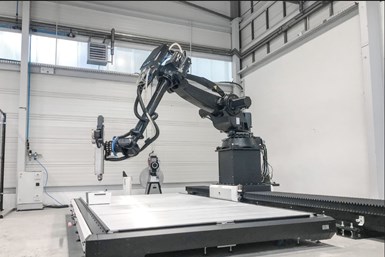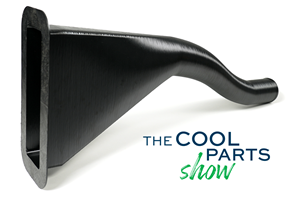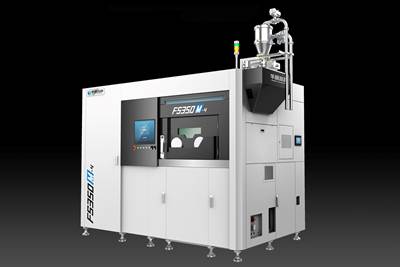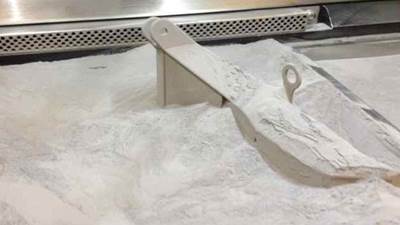AES, CEAD Collaborate on Large-Format Robotic Additive Manufacturing
Additive Engineering Solutions (AES) will receive one of CEAD’s Flexbot Robotic additive manufacturing systems to help CEAD with customer development projects and give feedback to help drive further development and innovation of the systems.
Additive Engineering Solutions (AES), a provider of large-format additive manufacturing (LFAM) polymer solutions, is partnering with CEAD (Delft, Netherlands), a manufacturer of large-scale robotic 3D printing systems. CEAD chose to collaborate with an additive manufacturing company in North America in order to advance its goals for that market.
“We knew that if we wanted to penetrate the North American market effectively, having a local, experienced partner is crucial to aid in customer development projects,” says Charléne van Wingerden, CEAD CCO.
CEAD’s business model is selling robotic AM systems, while AES sells engineering and project solutions for firms that do not have their own 3D printers. The companies say they have created a well-rounded, complementary partnership.
“Instead of CEAD performing customer project trials in Europe and shipping to the United States, we will now be able to print and showcase the technology at much more local level, all while gaining experience and knowledge on a new AM platform,” says Austin Schmidt, AES president and co-founder.
Toward the end of 2023, AES will receive one of CEAD’s Flexbot Robotic AM systems, which is designed to be modular in both size and capability, and enable upgrades and expansions to be made as needed.
“We are excited to get our Flexbot system into the hands of the talented team at AES. Not only will they help out on customer development projects but we look forward to receiving their feedback that can help drive further development and innovation of our systems,” says Lucas Janssen, CEAD CEO and co-founder. “We believe in order to be the best at what we do, we need partners to be the best at what they do, and we have that with AES.”
AES was founded in 2016 to bring the newly developed LFAM technology to the marketplace as a service. The company says it has aimed to both educate the industry on the technology’s value as well as further develop the technology and equipment in a commercial environment.
AES says it currently has the largest global capacity of LFAM-style 3D printers with four Cincinnati BAAM printers. The CEAD Flexbot system will be its first robotic AM system, enabling the company to manufacture larger and more complex structures and parts.
“We believe robotic systems with their unique capabilities, modularity and small footprint is the way the LFAM printing market is heading and we’re excited to use this new technology to expand our solutions across the tooling, full-scale mockups and part production markets,” says Andrew Bader, AES vice-president and co-founder.
AES was founded in 2016 as a contract manufacturer of large-format 3D printing services. Today, it says is has the largest global capacity of large-format 3D printing, enabling it to provide quick turn and economical solutions for the composite tooling markets, engineered and marketing mockups, and thermoplastic end-use parts.
- Read more about AES in this article about the large-format additive manufacturer moving to serial production. First tools, then production parts. This pattern with industrial 3D printing at small and mid sizes has now come to the biggest additive machines as well.
- Learn why Additive Engineering Solutions dug a pit in an additive manufacturing facility. AES moved two of its BAAM 3D printers out of the way and began to dig a hole in the floor. How going lower enables AES to build higher.
- Watch this episode of The Cool Parts Show to hear about how a flight simulator was made through large-scale 3D printing at AES. It was the show’s biggest cool part so far! Printing this massive structure in one piece saves cost and time for L3Harris.
Related Content
Aircraft Ducts 3D Printed in Composite Instead of Metal: The Cool Parts Show #68
Eaton’s new reinforced PEKK, tailored to aircraft applications, provides a cheaper and faster way to make ducts compared to formed aluminum.
Read MoreVideo: Construction 3D Printing with Robotics, Geopolymer
Alquist 3D is aiming to revolutionize construction and infrastructure with large-format robotic 3D printing using a carbon-neutral material.
Read MoreVideo: For 3D Printed Aircraft Structure, Machining Aids Fatigue Strength
Machining is a valuable complement to directed energy deposition, says Big Metal Additive. Topology-optimized aircraft parts illustrate the improvement in part performance from machining as the part is being built.
Read MoreRobot Vs. Gantry for Large-Format Additive Manufacturing (Includes Video)
Additive Engineering Solutions, specialist at 3D printing very large parts and tools on gantry machines, now also uses a robot for large-format AM. Here is how the robot compares.
Read MoreRead Next
3D Printed Polymer EOAT Increases Safety of Cobots
Contract manufacturer Anubis 3D applies polymer 3D printing processes to manufacture cobot tooling that is lightweight, smooth and safer for human interaction.
Read MoreBike Manufacturer Uses Additive Manufacturing to Create Lighter, More Complex, Customized Parts
Titanium bike frame manufacturer Hanglun Technology mixes precision casting with 3D printing to create bikes that offer increased speed and reduced turbulence during long-distance rides, offering a smoother, faster and more efficient cycling experience.
Read MorePostprocessing Steps and Costs for Metal 3D Printing
When your metal part is done 3D printing, you just pull it out of the machine and start using it, right? Not exactly.
Read More





















